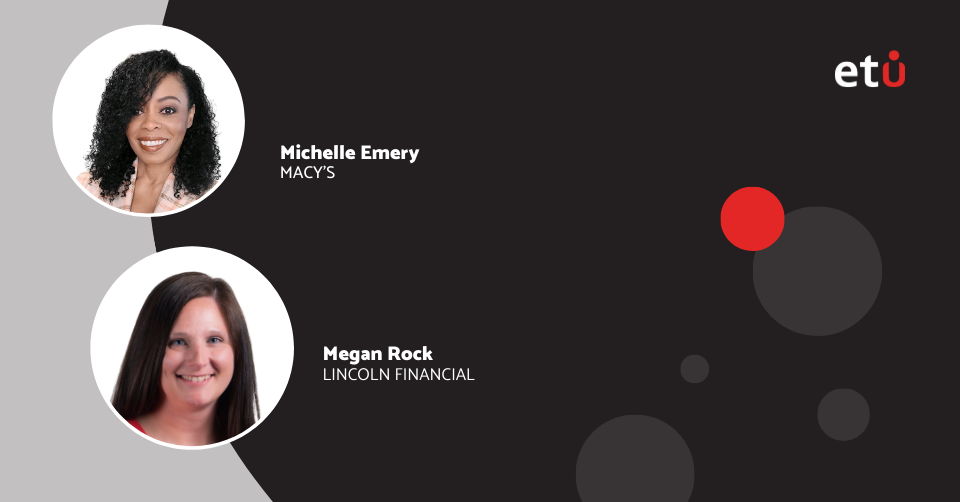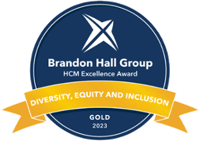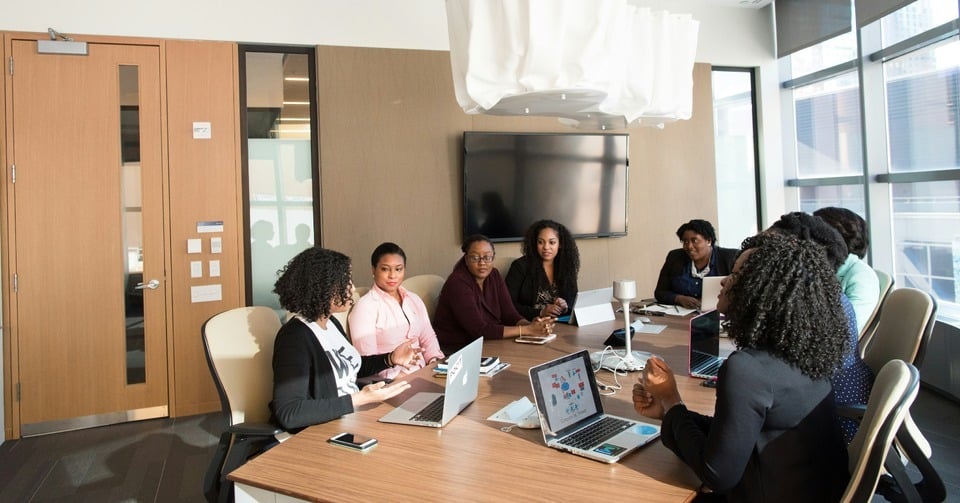
How Macy’s and Lincoln Financial won big with simulation-based learning
Expert Panel: Creating breakthrough learning experiences that deliver skill and behavior data
This recorded webinar takes a tour through two award-winning learning programs. Macy’s and Lincoln Financial Group were recognized with Brandon Hall gold awards for their innovative use of simulation-based learning to change workforce behavior at scale.
Our expert panel featuring these two award winners provides practical ideas on how to:
- Give employees the practice they need for critical skills
- Benchmark existing skill levels
- Pinpoint behaviors where learners need support
- Measurably upskill with precision – while reaching thousands of learners
- Delight learners with highly engaging training
DEI skill benchmarks and insights at Macy's Inc.
Michelle Emery: We were actively searching for unique, effective methods to address issues of unconscious bias within our workplace, and we wanted to explore various options that were engaging and impactful. We knew that traditional unconscious bias training really failed to effectively reinforce and measure. It doesn't provide any specific strategies to develop new habits and new behaviors and didn't provide us any clear metrics or the ability even to track our own progress. So that's why we had to really take a step to consider alternative methods that promote engagement, interaction, and the assessment of our overall skills. This happened with a group of subject matter. Experts from various parts of our organization came together to say what DEI skills were most impactful to us. And what did we want to continue to benchmark and measure? So we can evaluate that progress over time. We came up with these five:
- acting on unconscious bias
- awareness and mitigation of microagressions
- communicating with empathy
- cultivating an inclusive environment
- displaying advocacy and allyship
So now, let's talk about how we worked with ETU. In collaboration with ETU, we put together a set of scripts that were designed to reflect the real-life scenarios that occur within our three different workplaces that we have throughout Macy's. Inc. Those workplaces are stores, supply, chain, and central. Each of the scripts really aimed at providing an accurate representation of different and realistic scenarios that our colleagues were likely to encounter within their specific workplace.
Let's talk about what we learned. What were some of the outcomes but mostly, I want to share the feedback. There were thousands of comments that our colleagues input at the end of the simulations. This was definitely the most amount of feedback that we have ever received from any training program that we have initiated at Macy's, Inc. Some of the sentiments were that this was the best training that they had ever gone through. They're proud to be part of an organization that takes DEI seriously.
Our colleagues really enjoyed it and still speak to this day about scenarios during the simulations. When I get a chance to visit stores, they always tell me I have a situation. It was on that training we had, and now I know what to do because of that DEI simulation. They also stated that it gave them practical guidance on handling situations in the future, so maybe they hadn't quite encountered that situation yet. The practical guidance plays out as the scenario plays out, and an answer is chosen by our colleagues. A coach then comes on to share the best option and why their option may not have been the best one. Because we were very, very intentional to refrain from saying that it was right or wrong or incorrect so that we can inspire that confidence.
So again, traditional, unconscious bias training. You take it, you press yes, no, yes, no, and you have these very simplistic answers. This set of simulations gave our colleagues a chance to practice in private and to be guided along the session with a coach. The last thing I'll tell you about our colleagues' feedback is that the number one feedback was that we want more. They wanted more scenarios. They wanted us to cover a wider range of topics so that they could continue to learn more and apply all of that knowledge to what they do every single day.
The majority of our colleagues found the training sessions to be informative and relevant to their job responsibilities. And again, that is, whether or not they're in stores, supply, chain, or central. That was extraordinarily important for our colleagues to have it be relevant to what they do every single day. Because of that, they express that they are going to actively apply the knowledge and skills that they gained to enhance their overall performance.
Innovative Leadership Development at Lincoln Financial
Megan Rock: The Leadership Lab is our flagship leadership program here at Lincoln Financial Group. And it is a true blended curriculum. It's a 6-week program. There's a general session where all of the leaders come in who are enrolled in the program. We have guest speakers, we do breakouts, and there's a facilitator.
What we had originally was virtual simulations with headsets. Some people were having challenges getting the technology to work. Some people were getting sick from the technology being so close to your face. So we wanted to look at a different simulation solution that's how we came to ETU.
We knew that our managers, while they had some foundational skills in how to give feedback, how to coach, and how to have a crucial conversation. It didn't always translate naturally into how to do that in a virtual environment. So, we had to teach managers what looked different now that they are expected to lead any virtual or hybrid environment. We also wanted to improve critical conversations. One of the things we know is that when you lead virtual teams, having solid conversations with your team, being more connected with them, and giving them feedback more frequently are critically important for us to be successful. And so we knew that those critical conversations really needed to be improved, and that's really why we leaned on ETU because we wanted that emotionally immersive first-person simulation platform.
We wanted the managers who are going through this leadership program to be able to see themselves to say I had that exact situation come up, and I didn't really know how to manage it. Or where I've heard other people have to go through this, but I haven't done it before, and I'm really nervous. So they can practice these skills. They can practice having these conversations in the safety of their own home.
The way we work at Lincoln, it's not always just face-to-face conversations. It's sometimes a phone call. Sometimes it's a Teams chat, sometimes it's an email. We were really able to create that diverse experience within these modules.
We've heard wonderful feedback. I mean, the best feedback we can receive, where the managers say that was realistic. That felt like it was me in my day to day. That's exactly what we were trying to get at. We wanted them to be able to practice these things.
In the data, we can see that a hundred percent of our participants, time and time again, have been telling us, I'm going to apply this. This will really help me do my job better as a manager, and that's our goal. We just want everybody to be better at what they do so that they feel confident they can succeed. And when you look at the skills dashboard, you can see the improvement in skills. So after they took the simulations, we can actually go back in and see, okay, here's where we started versus. Here's where we are. Their skill set has improved. The dashboards have been helpful to us in a couple of different ways. Not only can we see the improvement in skill, but we can also see if we have a skill we need to address.
Panel discussion on skill data and lessons learned
Katie Laidlaw: How have you considered what actions to take based on the data gathered?
Michelle Emery: Last year was an exploration to develop the skills so that we established that benchmark. We've established that baseline measuring. So that's why I was really excited to hear Megan's and Lincoln are already at that measurement stage. Everyone on this call is from different organizations and we're all at a different step in our journey. So that's step 2 for us is going back to measure how we improved the skills. So, with that, we will embed our DEI skills into all of the education and programming we have already built.
Megan Rock: The data shines a light on things that we might otherwise miss. We can see in that dashboard if there are particular skill sets that we need to focus more on. That's a cue to us that we've got to do more more than just the simulation. We need to have more conversations, maybe more programs. Maybe it's embedded in some of our policies.
I think it also helps us understand what are the future needs of the organization. Lincoln Financial has been undergoing a large reorganization. We need to make sure that we are helping the Lincoln of tomorrow.
Michelle Emery: I would say data is the backbone of what we do in our Diversity, Equity, and Inclusion office. We utilize data in so many different ways. We look at data on representation to understand the gaps and understand where we stand, and how we can possibly fill those gaps. When it comes to skills, we identify where we need to improve. How do we create additional education or touch points along our colleagues' journey to improve these skills? And I love what you said, Megan, about the future. We're definitely thinking about that as well. How do we move, DEI into the future and ensure that it is aligned with our business objectives.
Katie Laidlaw: When you think about stakeholders engaging in the projects we highlighted here, what's been some of the reaction?
Megan Rock: We absolutely have been engaged with our stakeholders every step of the way. Somebody said the phrase to me once: do you want to go fast, or do you want to go together? And I think that this is one of those things where you have to go together.
Michelle Emery: Gaining that buy-in, having that through for our stakeholders, was extraordinarily important. And, like Megan said, defining and being clear about your goals, because this can be a little intimidating. Understanding your colleagues' base understanding, what that tone looks like in your organization is going to be very important. Then, engage those key stakeholders at the highest level of leadership to really talk through what your goals are for the overall simulation and the training.
Katie Laidlaw: what advice would you give those considering using simulations as part of their learning and DEI programs?
Megan Rock: One of the things that comes to mind for me is when we first started looking at a different type of simulation. It was intimidating, I do not have a technology background. My team does not have a technology background. And so we felt like, will we even be able to pull this off? But the partnership that ETU has brought means we're in good hands. They've asked so many questions to deeply understand our culture. What's important to us, what's going on in the business. So my biggest piece of advice is if you are considering moving in this direction, be open and set feedback, and trust that the experts on the ETU side really do know what they're doing. It will get you a great product through that partnership.
Michelle Emery: I agree 100%. I think the advice I would give the group is to create realistic scenarios. I was unsure that they could create something right for us, right for Macy's Inc. Through collaboration and several meetings with the team, they were so actively engaged in creating something new, different, fresh, and innovative. They had no issues with everything we were asking them to do in bringing those real-life scenarios. I think when our colleagues see themselves in the scenario, they know that this situation happened in their store or happened on a call 3 days ago.
ETU was fantastic for us, bringing all our information to this platform. It took on a life of its own from there, and we were able to create something together that will live long in our colleagues, minds.
and they still talk about it today.
Simulations are used to develop soft skills in a wide range of programs select a sample simulation to try out the learner experience for yourself.
Speakers:
 
Megan Rock |
 
Michelle Emery |

